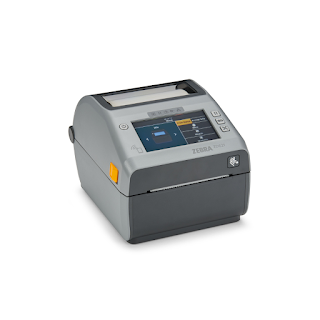iDPRT RFID Barcode Label Printer
An iDPRT RFID Barcode Label Printer is a specialized device that combines the functionalities of a standard barcode label printer with the ability to encode (read and write data to) RFID (Radio Frequency Identification) tags.
iDPRT, a prominent manufacturer in the AIDC (Automatic Identification and Data Capture) industry, offers various industrial and desktop printers with optional RFID capabilities. Examples of their industrial RFID-enabled printers include models in their iX4R (Industrial) and iT4R (Desktop) series.
Key Features of an iDPRT RFID Barcode Label Printer:
Dual Functionality (Print & Encode):
Barcode/Label Printing: Prints high-quality text, barcodes (1D and 2D), and graphics using either Direct Thermal (no ribbon, for temporary labels) or Thermal Transfer (uses ribbon, for durable, long-lasting labels) methods. Common resolutions are 203 dpi or 300 dpi.
RFID Encoding: Equipped with an integrated UHF (Ultra High Frequency) RFID reader/writer module. It can:
Read existing data on an RFID tag.
Write new data to the tag's memory (e.g., EPC, User Memory).
Lock/unlock tags.
Verify the encoding process to ensure data integrity.
RFID Protocol Support: Typically supports the global standard GS1 EPC Gen2 v2 / ISO 18000-6C, ensuring compatibility with most modern RFID systems.
Variable RFID Antenna Positioning: Advanced RFID printers allow for precise positioning of the RFID antenna (often an "on-metal" or "standard" fixed position antenna). This is crucial for accurately encoding different types and sizes of RFID inlays, including those for on-metal applications.
Label/Tag Compatibility: Designed to work with special RFID labels that have an embedded RFID inlay. These can be standard paper/synthetic labels or specialized on-metal tags. They usually specify a minimum label/tag pitch (distance between tags) for proper encoding.
High Performance: Industrial models offer high print speeds (e.g., up to 14 inches per second) and powerful processors (e.g., 32-bit RISC CPU) with ample memory (e.g., 512 MB RAM, 256 MB Flash) to handle complex printing and encoding tasks efficiently
Connectivity: Standard interfaces include USB, Ethernet (TCP/IP), and Serial (RS232).
10 Many models also offer optional Wi-Fi and/or Bluetooth for flexible network integration.11 User Interface: Often features a color LCD touch screen and operation buttons for easy setup, calibration, and offline operation.
Durable Build: Industrial RFID printers typically have robust, all-metal bodies designed for demanding environments like warehouses, factories, and logistics centers.
Software Support: Comes with drivers for common operating systems (Windows, macOS, Linux) and often includes complimentary label design software (e.g., Bartender UltraLite) that supports both barcode printing and RFID encoding.
Common Applications:
iDPRT RFID Barcode Label Printers are vital for industries implementing RFID technology for:
Inventory Management: Rapid and accurate tracking of goods in warehouses and retail.
Asset Tracking: Monitoring high-value assets, IT equipment, tools, and vehicles.
Supply Chain & Logistics: Automating receiving, shipping, and order fulfillment processes.
Manufacturing: Tracking work-in-progress, finished goods, and components.
Healthcare: Managing medical equipment, patient records, and pharmaceuticals.
Retail: Enhancing inventory visibility, improving checkout efficiency, and preventing theft.
Libraries/Documents: Tracking books and important files.
iDPRT RFID Barcode Label Printers are specialized, high-performance machines. Their price is significantly higher than basic barcode label printers due to the integrated RFID encoding capabilities.
For a new iDPRT RFID Barcode Label Printer (e.g., from the iT4R or iX4R series, or similar industrial/desktop models with RFID), you can expect the price in Lahore to range from PKR 250,000 to PKR 500,000+.
Factors influencing the price include:
Printer Series: Industrial-grade printers (e.g., iX4R) will be more expensive than desktop models (e.g., iT4R).
Print Resolution: Higher resolution (300 dpi vs. 203 dpi) can slightly increase the cost.
Features: Additional options like Wi-Fi, Bluetooth, cutters, peelers, or specific industrial certifications.
Vendor and Warranty: Authorized distributors offering good warranty and after-sales support may have slightly higher prices.
Where to Buy in Lahore:
Purchasing an RFID barcode label printer requires specialized suppliers who understand both printing and RFID technology.
Specialized AIDC (Automatic Identification and Data Capture) Solution Providers:
Companies that deal in barcode printers, barcode scanners, RFID readers, and inventory management solutions are the best source.
Ahmed Infotech Solutions (itsrfid.com.pk): As a key player in RFID solutions in Pakistan, they are highly likely to supply iDPRT RFID printers or similar models from other brands.
Packman (packman.pk): They explicitly mention offering "RFID Printers" and comprehensive RFID solutions, making them a strong candidate for iDPRT or alternative brands.
Online Marketplaces (with caution for high-value items):
- Consultation on the best model for your specific RFID application.
- Installation and configuration.
- Integration with your existing WMS/ERP systems.
- Training for your staff.
- Warranty and reliable after-sales technical support.
When inquiring, be specific about your needs, including the type of labels you will be using (e.g., standard, on-metal), the volume of printing/encoding, and any software integration requirements.



